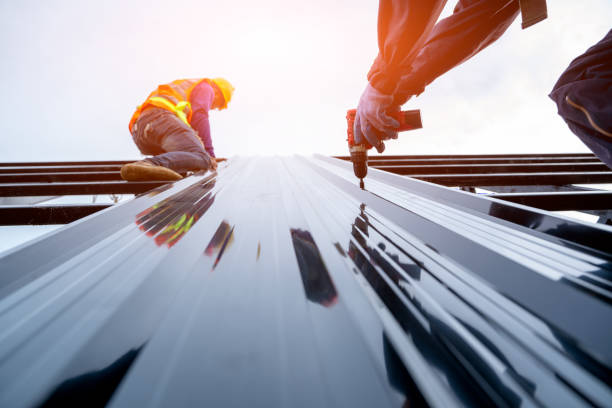- Cleaning Roof, Roofing
- 0 Comment
Metal roofing is becoming an increasingly popular choice for homeowners due to its durability, energy efficiency, and aesthetic appeal. Whether you’re considering installing a new metal roof or need repair work on an existing one, understanding the basics can save you time and money. This guide will walk you through everything you need to know about residential metal roofs, metal roofing repair, and finding the right metal roof installers.
Have you ever thought about the roof over your head? Probably not as much as you should. The type of roof you choose for your home can make a big difference in terms of durability, energy efficiency, and even the resale value of your home. Metal roofs are an excellent choice for many homeowners. They are strong, long-lasting, and can withstand extreme weather conditions. In this article, we’ll explore the benefits of residential metal roofs, the cost, how to choose the best metal roof installers, and much more.
Benefits of Residential Metal Roofs
Durability and Longevity
One of the most significant advantages of metal roofs is their durability. Unlike traditional asphalt shingles, metal roofs can last 40-70 years, depending on the material. They are resistant to wind, fire, and impact, making them an ideal choice for areas prone to severe weather.
Energy Efficiency
Metal roofs reflect solar radiant heat, which can reduce cooling costs by 10-25%. This energy efficiency can lead to significant savings on your energy bills over time.
Aesthetic Appeal
Modern metal roofs come in a variety of styles, colors, and finishes, allowing homeowners to achieve the exact look they desire. Whether you prefer the traditional look of shingles or the sleek appearance of metal panels, there’s a metal roofing option for you.
Types of Metal Roofs
Steel Roofing
Steel is the most common type of metal roofing material. It is affordable, durable, and available in various styles and colors. Galvanized and galvalume steel are popular choices for their corrosion resistance.
Aluminum Roofing
Aluminum is lightweight, resistant to rust, and ideal for coastal areas. It is also more expensive than steel but offers excellent longevity and performance.
Copper Roofing
Copper roofs are premium options known for their distinctive appearance and long lifespan. They develop a natural patina over time, adding to their charm and uniqueness.
Zinc Roofing
Zinc is another high-end material that is both durable and eco-friendly. It has a self-healing property that makes scratches disappear over time, ensuring your roof remains attractive and functional.
Cost Considerations
Initial Costs
The initial cost of installing a metal roof can be higher than other roofing materials. However, the long-term benefits and savings on maintenance and energy bills often outweigh these upfront expenses.
Long-Term Savings
Due to their durability and energy efficiency, metal roofs can save you money in the long run. They require less maintenance and are less likely to need replacement, making them a cost-effective choice over time.
Choosing the Right Metal Roof Installers
Experience and Reputation
When selecting metal roof installers, it’s crucial to consider their experience and reputation. Look for installers with positive reviews and a proven track record in metal roofing installations.
Licensing and Insurance
Ensure the installers you choose are licensed and insured. This protects you from liability in case of accidents or damage during the installation process.
Warranty and After-Sales Service
A good installer will offer a warranty on their work and provide after-sales service. This guarantees that any issues that arise after installation will be addressed promptly.
Signs Your Metal Roof Needs Repair
Leaks and Water Damage
One of the most obvious signs that your metal roof needs repair is leaking. Water stains on your ceiling or walls indicate that water is seeping through your roof and needs immediate attention.
Rust and Corrosion
While metal roofs are designed to resist rust, they can still develop corrosion over time. If you notice rust spots or corrosion, it’s essential to address these issues quickly to prevent further damage.
Loose or Missing Fasteners
Fasteners can become loose or go missing due to weather conditions or improper installation. Regularly inspect your roof and replace any missing or loose fasteners to maintain its integrity.
Common Metal Roofing Problems
Oil Canning
Oil canning is a visible waviness in the flat areas of metal roofing repair. While it is mainly an aesthetic issue, it can be minimized by choosing the right materials and installation techniques.
Scratches and Scuffs
Scratches and scuffs can occur during installation or due to debris. Most metal roofs have a protective coating to prevent damage, but it’s essential to address any visible scratches promptly.
Panel Damage
Extreme weather conditions, such as hail or falling branches, can cause damage to metal panels. Inspect your roof after severe weather events and repair any damaged panels to prevent leaks and other issues.
DIY vs. Professional Metal Roofing Repair
DIY Repairs
While some minor repairs can be done by handy homeowners, most metal roofing repairs should be handled by professionals. DIY repairs can void warranties and may not address the root cause of the problem.
Professional Repairs
Metal roofing repair ensures that the job is done correctly and safely. Professional installers have the necessary tools, experience, and knowledge to handle repairs effectively.
Maintenance Tips for Metal Roofs
Regular Inspections
Conduct regular inspections of your metal roof, especially after extreme weather events. Look for signs of damage, such as leaks, rust, or loose fasteners.
Cleaning and Debris Removal
Keep your roof clean and free of debris. Leaves, branches, and dirt can trap moisture and cause corrosion. Regular cleaning helps maintain the roof’s appearance and functionality.
Protective Coatings
Applying a protective coating can extend the life of your metal roof. These coatings provide an additional layer of protection against the elements and help prevent rust and corrosion.
Environmental Benefits of Metal Roofs
Recyclability
Metal roofs are 100% recyclable at the end of their life cycle. This makes them an environmentally friendly choice compared to traditional roofing materials that contribute to landfill waste.
Energy Efficiency
As mentioned earlier, metal roofs reflect solar heat, reducing the energy needed for cooling. This energy efficiency contributes to lower carbon emissions and a reduced environmental footprint.

